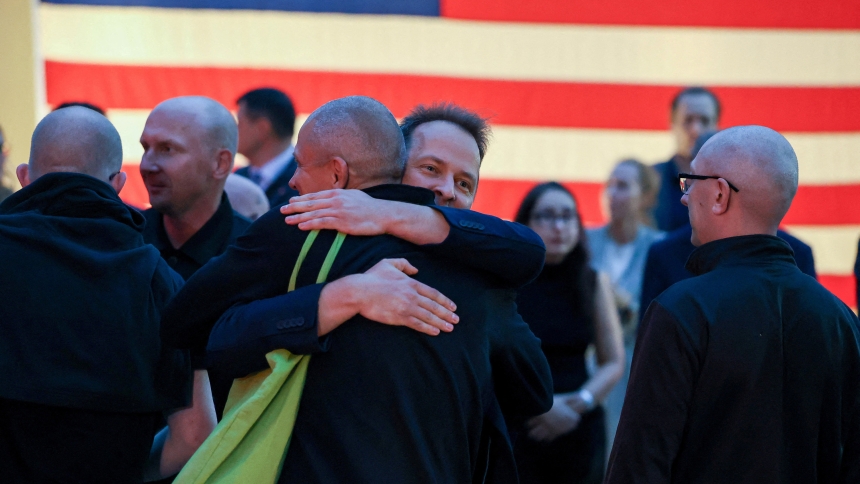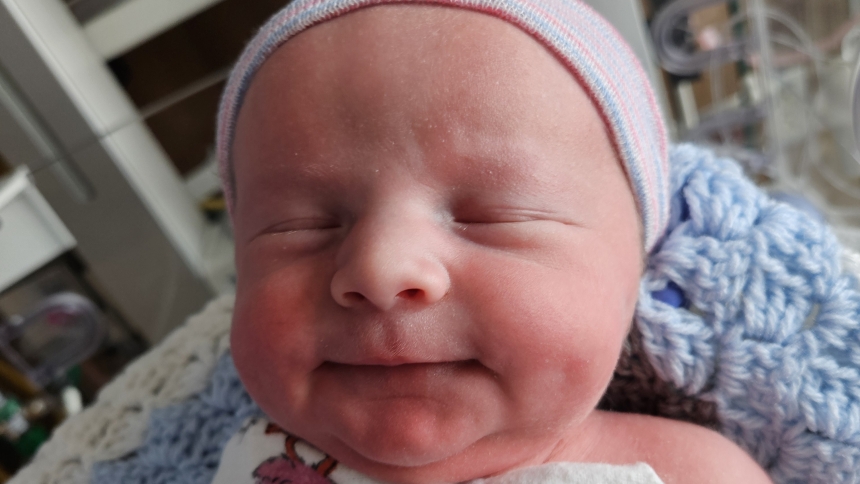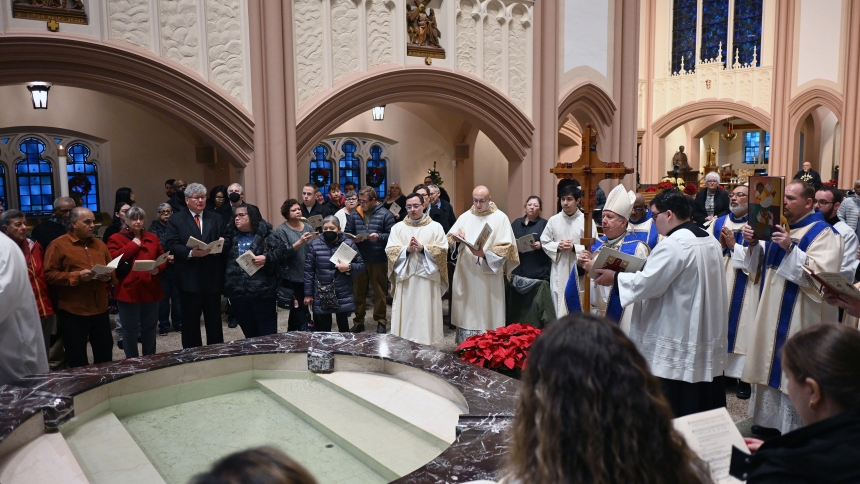
(OSV News) - Human rights campaigners have accused the Belarus government of using imprisoned Catholic priests as "hostages," as a Polish Carmelite became the latest detained for alleged espionage.
"The state sees Poland and the Catholic Church as enemies. ... This is why they're staging these set-ups," explained Andrei Krylov, a political prisoner newly released from a five-year term for "organizing mass riots."
"The Belarus regime is a criminal entity, and the only pressure it fears is media publicity," Krylov said.
"We need to get this across to the world, we need to get this across to the Vatican, so they can do something, free people. So the regime will be afraid."
Krylov provided testimony in Vilnius, Lithuania, after being released on Sept. 11 with 51 others by the regime of Alexander Lukshenko, who began a seventh term as Belarus president after claiming victory with 86.8% of votes in January elections, despite international sanctions.
In an interview with Belarus' Christian Vision organization, he said he had been in close touch while imprisoned at Babruisk with Father Henrykh Akalatovich, an elderly and unwell parish rector from Valožyn, who began 11 years in the penal colony in April for "high treason."
He said the priest had resisted KGB police pressure to testify falsely against other Catholic clergy and had refused to request a pardon, believing he was being held as a "hostage and prisoner of war" because of his faith.
Meanwhile, a prominent lay Catholic confirmed that priests were often blackmailed during "preventive conversations" with officials in the ex-Soviet republic, using espionage and sexual abuse accusations, and had not been shown the slightest "human kindness" by the Vatican.
"There's been much diplomatic balancing, and that's understandable -- but simple signs of closeness have been lacking, even though many people have approached the Vatican, asking for them," Artiom Tkaczuk, a social worker now living in neighbouring Poland, told OSV News.
"We understand the important efforts undertaken by the Holy See. But we can't ignore those waiting with pain and hope for a single word of support. While Pope Leo continues his predecessor's work, we hope it'll be accompanied by a few signs and gestures to give people comfort."
Father Grzegorz Gawel, a 27-year-old Carmelite from Krakow's Basilica of the Visitation of the Blessed Virgin Mary, was detained Sept. 4 in a parking lot at Lepel, near Vitebsk, and accused of collecting information about "Zapad-2025," a Russian-Belarusian military exercise.
Belarus' state TV said the Carmelite had been handed an eight-page printout by a local collaborator "in the interests of Polish special services," adding that the filmed incident provided "irrefutable evidence" of his "spying activities."
Father Gawel's arrest was confirmed in a brief Sept. 6 statement by the Krakow Carmelites, who requested prayers.
Meanwhile, Belarus's Commissioner for Religious and National Affairs Alexander Rumak told state TV he regretted Catholic clergy were being "drawn into illegal activities," and said he had asked the Vatican's newly accredited apostolic nuncio, Archbishop Ignazio Ceffalia, to convey "objective information about the incident" to Rome.
However, the Polish government branded the arrest "evident provocation" by the Lukashenko regime, while Poland's president, Karol Nawrocki, said he had raised the cases of the Carmelite and other detained Catholic clergy during Sept. 5 talks at the Vatican.
Dozens of other Catholic, Orthodox and Protestant clergy have faced arrest in Belarus, including Oblate Father Andrzej Juchniewicz, chairman of Major Superiors, Delegates and Representatives of Institutes and Societies of Apostolic Life, who was sentenced to 13 years in April at a closed trial when his charge of unspecified "subversive activities" was changed to "criminal offenses" involving sex with minors.
In his interview, Krylov said he had had few contacts with Father Juchniewicz, a "kind and benevolent person." who had been assigned "low status" and separated from other inmates at the Bobruisk colony.
However, he added that he had been close to Father Akalatovich, who was handcuffed and hooded by KGB police in November 2023, after being lured to a Valozyn cemetery by a false request to conduct a burial.
All money and possessions were seized from the priests, Krylov said, after he was told he owed the state 1 million euros in damages for diverting military aircraft at his village presbytery.
Having been denied any spiritual support, including access to an Orthodox chapel at Bobruisk, Father Akalatovich had been taken to Minsk in mid-2025 and offered freedom to return to his parish if he helped compromise the Vatican's nuncio, Archbishop Ceffalia, by planting a device in his luggage.
Despite KGB pestering, however, he had refused, Krylov told Christian Vision, insisting he would never "betray God" by "committing such a crime."
Christian Vision's coordinator, Natallia Vasilevich, told OSV News it was widely assumed the priests had been arrested to "escalate tensions" with Poland and pressure the Vatican to remain silent about human rights abuses.
She added that Archbishop Ceffalia, who presented his credentials to Lukashenka on Sept. 11, appeared aware of his "difficult mission" in Belarus, and had so far kept away from local clergy to avoid "attempted provocations."
"There's no doubt the Vatican has instruments to pressure the regime if it chooses to use them," said Vasilevich, who also co-founded a Christians Against War movement in 2022 and who holds a doctorate from the University of Bonn in Germany.
"Only this, and relentless negative publicity, can help Belarus's political prisoners, including these priests now sitting in prison colonies for their faith under false charges."
Catholics make up around a 10th of the 9.4 million inhabitants of Belarus and have seen their parishes cut from 94 to 85 under a 2023 freedom of conscience law, which prohibits religious activities deemed to infringe Belarus' "sovereignty, constitutional system and civil harmony," and required all religious associations to re-register by July 2025 or face liquidation.
Fathers Akalatovich and Juchniewicz are among 1,184 Belarusian inmates currently recognized by human rights groups as political prisoners, who include an eminent Catholic layman, Ales Bialiatski, winner of the 2022 Nobel Peace Prize.
In his OSV News interview, Tkaczuk said other prisoners had described the "caste system" operating in Belarus' penal colonies, with those at lowest level barred from any interaction with fellow-inmates.
He added that Father Juchniewicz, although jailed on false charges, would be forced into the "dirtiest and most humiliating jobs," such as cleaning floors and toilets, and would require extensive "psychological and psychotherapeutic treatment" if ever released.
"Being part of the worldwide universal Catholic Church remains a powerful source of succour for Catholics in Belarus," the exiled Catholic social worker said.
"They need to know they can count on the church abroad to stand with them, show solidarity and not forget about their problems."
Meanwhile, Vasilevich said any form of activity which failed to reflect support for Lukashenka, in power for 32 years, could be branded a "political crime" in Belarus, including "being Christian, praying and holding independent opinions."
"It's essential these cruel and absurd arrests and sentences are publicized," the Christian Vision coordinator told OSV News.
"Catholic priests are being used as hostages for use in talks with the West. They'll only be freed if this benefits the regime, such as by securing the lifting of sanctions."
Caption: Political prisoners released from Belarus are welcomed at the U.S. Embassy in Vilnius, Lithuania, Sept. 11, 2025. (OSV News photo/Kacper Pempel, Reuters)


